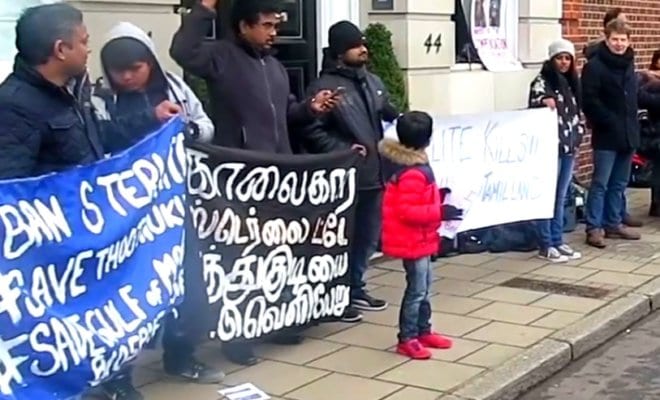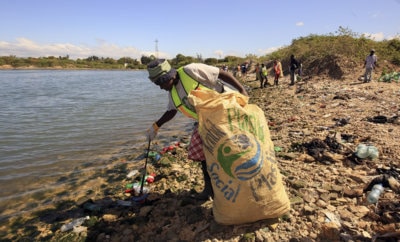Business
Tamils Protest Outside Vedanta Chief’s London Home Over Tamil Nadu Copper Plant

The protest outside Vedanta chief Anil Agarwal's home in London.
Photo: Facebook video screenshot
The Sterlite plant, a subsidiary of Vedanta Resources, has been at the center of controversy since its establishment at Tuticorin in Tamil Nadu.
In solidarity with the protesters who came out in Tuticorin to protest against UK-based company Sterlite Industries’ plans to expand in the town in Tamil Nadu, a sizable number of British Tamilians also took out a demonstration outside Vedanta Group chief Anil Agarwal’s home in London on the same day.
Sterlite is a subsidiary of Agarwal’s Vedanta Resources. The company has begun the construction of a new copper smelter plant on the outskirts of Tuticorin. The existing smelter plant has caused water, soil and air pollution since it was set up in year 1996, according to local residents of the area. The subsequent pollution has caused respiratory and skin problems, especially among children.
The protest protest in London was organised on March 24 by Foil Vedanta, an independent grassroots solidarity organization, alongside Tamil People in UK and Parai – Voice of Freedom, a UK based passive resistance movement.
“The copper smelter has continued to operate without various permissions, and pollute without remorse, causing a detrimental effect to local health and livelihoods. It is time the British government stopped supporting Sterlite and de-listed Vedanta from the London Stock Exchange,” Miriam Rose from Foil Vedanta, one of the organizers of the protest in London on March 24, was quoted as saying by PTI.
“Why is the company, which has one of the worst human rights records, one of the worst environmental records has 58% of its subsidiaries registered in tax-savings. Why is it listed in London? Why did London Stock Exchange allow this company to list and give it its reputation without doing any due diligence?,” a protester said in a video posted by Foil Vedanta on their Facebook page.
Another protester from Tamil People in UK told the news agency: “Although majority of the Tamil population living in the UK have adopted the British life, local customs and try to blend in with society, they still feel their heart is left in the Tamil land. This absolute disregard to life and irreversible environmental damage to their land brings out strong emotional upheaval hence the support and participation in protests like these.”
The protesters in London came together outside the Mayfair home of the Vedanta chief, carrying Tamil folk drums, calling out slogans such as, “Kekudha Kekudha, Tamizhar kural kekudha?” (Can you hear? Can you hear? the voice of the Tamils?), and holding up banners that said, “Sterlite Kills, Stay out of Tamil Land” and “Ban Sterlite from Thoothukudi (Tuticorin).”
The Vedanta Group said that the Tuticorin plant has received necessary regulatory clearances for expansion and that the well-being of all communities around its operations will be ensured.
“Zero discharge systems, utilization of waste for sustainable applications, energy efficient systems and stringent emission monitoring are the hallmark of Sterlite and these will only be strengthened through the expansion. The smelter plant is self-reliant in terms of power and water requirements and will not use any nearby natural resources,” the company statement said.
The Tuticorin plant has been in the eye of a storm since the laying of its foundation stone in the town in 1994. The protest in the town on March 24 saw around 15,000 people gather near Chidambaram bus stand, asking for the plant to be shut down. This full-day agitation came a month after 250 people went on a hunger strike after news of the expansion came out.
The plant was also fined by the Supreme Court of India for land and water pollution after a gas leak in 2013.
Agarwal, a UK-based Indian billionaire, set up Sterlite in India before he listed Vedanta Resources on the London Stock Exchange in 2013.



